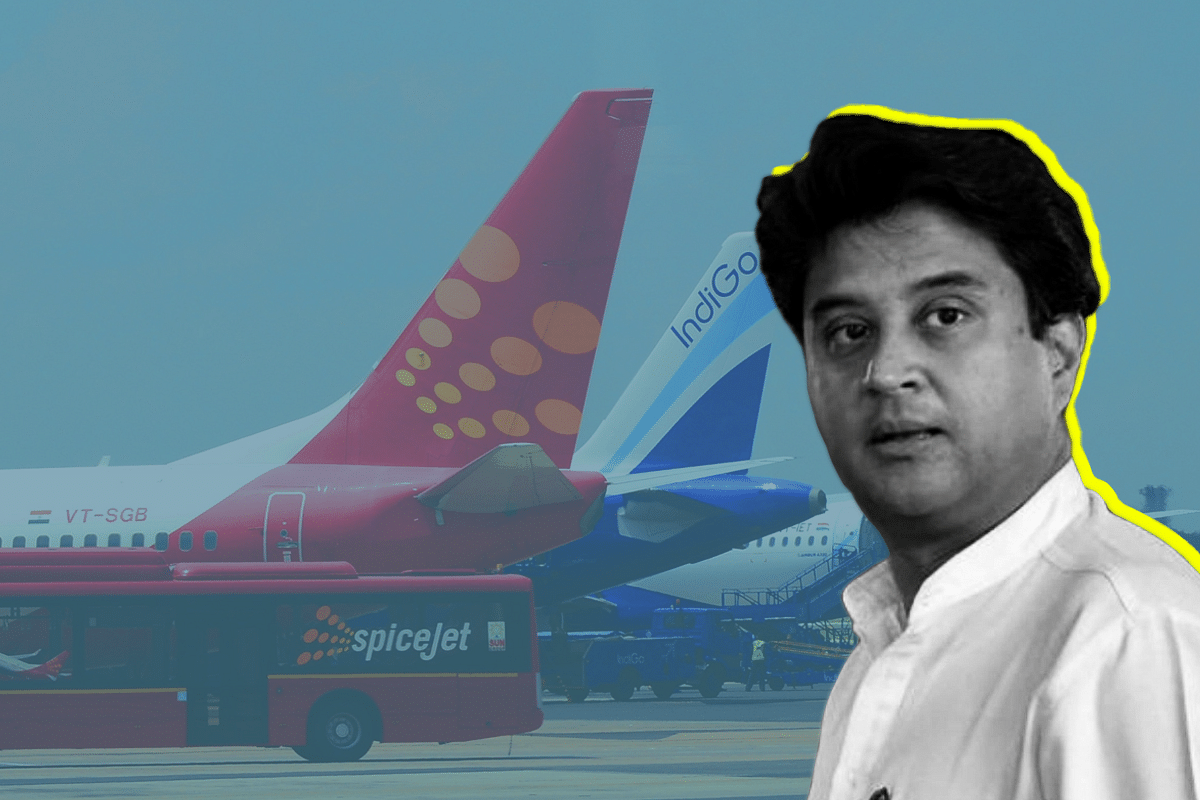Business
Birds Of Pay: With New Interventions By The Government, Indian Aviation Sector Begins To See Hope
- On Saturday, the government released new regulations which limited airfare caps to just half-a-month.
- The government has also increased the seating capacity in flights from 72.5 per cent to 85 per cent.

Jyotiraditya Scindia, Minister for Civil Aviation.
The government has introduced some measures to revive the aviation sector.
During the beginning of the pandemic, the government had introduced airfare caps for flights which limited the highest and lowest prices. These fare caps would be applicable for a month. But on Saturday, the government released new regulations which limited airfare caps to just half-a-month.
Airfare caps were introduced to prevent exorbitant pricing or undercutting by airlines. The upper cap kept customers from being price-gouged while the lower cap was meant to protect weaker airlines from going bankrupt.
Some airlines like SpiceJet have been struggling, with its auditor Walker Chandiok and Co. LLP raising questions about the company’s ability to continue as a going concern.
Its promoters have refused to infuse more funds and the company has been trying to restructure its debt. The government is attempting to save such weaker airlines by limiting undercutting and indirectly making passengers support the airlines.
The government had also increased the lower and upper limits of the air caps in August.
While a major part of flight bookings come closer to departure dates, bookings for departures 15 days ahead continued to increase since July.
The government has also increased the seating capacity in flights from 72.5 per cent to 85 per cent.
As demand picks up, the increase in seating capacity would allow airlines to achieve higher capacity utilisation and cover a larger part of their expenses.
Last month, the Minister for Civil Aviation, Jyotiraditya Scindia, had written to 22 states asking them to lower the Value Added Tax (VAT) for aviation turbine fuel (ATF) to within the one to four per cent range.
ATF forms a major component of the operating costs of an airline and therefore, tax on ATF contributes significantly to the ATF price. The minister cited examples of states like Kerala, Andhra Pradesh, Meghalaya, Nagaland, Sikkim, and Telagana.
All of these states have brought down VAT rates to one per cent or below, resulting in greater flight movement. With the rise in crude prices, ATF prices have also gone up.
“For example, the Government of Kerala has brought down VAT on ATF from 25 per cent to 1 per cent. Subsequently, the number of aircraft movements at Thiruvananthapuram airport increased from 21,516 flights to 23,566 flights in a span of six months, i.e. an increase of 2,050 aircraft movements post reduction of VAT. Similarly, aircraft movements at Hyderabad saw a rise from 76,954 flights to 86,842 flights in a span of six months, i.e. an increase of 9,888 aircraft movements after the reduction of VAT on ATF from 16 per cent to 1 per cent,” said the press release.
The Civil Aviation Ministry had also declared a new 100-day reform for the aviation sector in the previous week. The reforms are aimed at building back the aviation sector by working on infrastructure, policies and reforms.
Scindia said that the government would initiate development projects at four airports — Jewar, Kushinagar, Dehradun and Agartala.
In the past year, the airline sector has seen some of the largest losses in years. In contrast to weaker airlines, some of the stronger airlines like Indigo have been growing their fleet, while others like Vistara are looking to acquire other airlines.
Previously-grounded Jet Airways is likely to begin operations again, while investor Rakesh Jhunjhunwala’s Akasa Airlines might enter the market soon.
With the government’s help, the sector might be able to overcome the current pain and emerge stronger.
Support Swarajya's 50 Ground Reports Project & Sponsor A Story
Every general election Swarajya does a 50 ground reports project.
Aimed only at serious readers and those who appreciate the nuances of political undercurrents, the project provides a sense of India's electoral landscape. As you know, these reports are produced after considerable investment of travel, time and effort on the ground.
This time too we've kicked off the project in style and have covered over 30 constituencies already. If you're someone who appreciates such work and have enjoyed our coverage please consider sponsoring a ground report for just Rs 2999 to Rs 19,999 - it goes a long way in helping us produce more quality reportage.
You can also back this project by becoming a subscriber for as little as Rs 999 - so do click on this links and choose a plan that suits you and back us.
Click below to contribute.
Latest